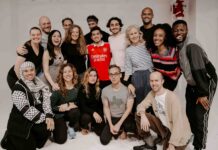Inside the Musack music charity Donick Cary founded—how guitars, mentors, and concerts are giving teens a voice and real hope.
When Emmy-winning writer–producer Donick Cary (Letterman, The Simpsons, Parks and Rec) launched the Musack music charity, Donick Cary founded in 2009, the idea was simple: give kids guitars, drums, and a reason to keep going.
What started as a hometown response to teen loss on Nantucket has grown into a nimble, globe-spanning nonprofit that equips classrooms, funds teachers, and builds programs kids actually want to attend.
“Do good things, jump in and do good things,”
donick Cary says.
“Lean towards the light.”
Sixteen years and thousands of success stories later, Musack’s proof point is clear: give a young person an instrument and a stage, and watch confidence, community—and joy—get louder.

How Musack Began (And Why It Still Works)
“I have 10 kids who want to play guitar and we have no guitars.” That line—from a Nantucket High School music teacher—sparked the first Musack fundraiser. Ten guitars became twenty. A small idea became a movement. Cary’s north star was personal: “How did we get through high school?
Music.
We found bands, we made mixtapes, we formed ska-punk groups, and we survived.”
The model is elegant and fast: identify a teacher or mentor, ask what kids want, fund the gear, and support the class. From a five-student band on a Navajo reservation to 500 guitars for Chattanooga public schools, Musack scales to the need. It’s DIY but disciplined—built for impact, not bureaucracy. And yes, it’s fun-loving, because joy is a feature, not a bug.
“It was like, oh there’s some answer here.”
Donick Cary
Programs Kids Actually Show Up For
Letting Students Lead
A lesson Musack learned early: don’t impose. Listen. When Nantucket teens asked for a rap program, Musack funded a production booth and a weekly mentor. The kids trudged through the snow carrying lyrics, not excuses. By spring they had a full set of original tracks—and voices they were proud to share. Authenticity beats a worksheet every time.
“We don’t want to impose a program on kids. We want to hear from them what they need. Because they’ll show up for that.”
Cary repeats it like a mantra: give students the mic, and they’ll do the rest. Whether it’s Bob Marley in an Australian detention center or jazz band in L.A., the path is the same—equip, encourage, repeat.
(Remember your first garage band? It was 70% feedback, 20% pizza, 10% actual chords. Still life-changing.)
The Musack Rock & Roll Carnival: A Backyard That Became a Beacon
What began as a birthday barbecue turned into an annual Rock & Roll Carnival in Cary’s Los Angeles backyard—500 guests, comedy, and full sets from artists who believe in the mission. Past performers have ranged from Childish Gambino and Weird Al to Rancid and The Specials. Students often open the show; sometimes artists sit in with the kids. It’s flavor-packed community—equal parts block party, fundraiser, and masterclass.
A favorite tradition: limited-run 7-inch records with a pro artist on the A-side and student musicians on the B-side. That’s not just fundraising. That’s invitation and inclusion.
(If you’ve ever tried to outbid Tony Hawk for a signed Neil Young guitar at a silent auction, you already know Musack crowds are competitive—and fun-loving.)
“Lean Towards the Light”: Cary’s Playbook for Building Impact
-
Collaborate like a band. “It’s a team sport,” Cary says. Everyone has a part—students, teachers, donors, artists.
-
Listen first. Programs are built around what kids actually want to learn. That’s why they keep coming back.
-
Embrace ‘no’ and keep moving. In TV and in charity work, rejection is a mile marker, not a wall.
-
Make it joyful. The work is serious; the experiences can be flavor-forward and fun-loving—shows, studio time, real stages.
“Most of the artists involved say, a guitar saved my life. We want to make sure every kid has that chance.”
For context on youth mental health and protective factors like creative outlets, see the National Institute of Mental Health’s resources: nimh.nih.gov.
How to Help (And Direct Your Impact)
Musack welcomes “sugar moms and dads” (Cary’s words) who want their dollars to land quickly where they matter. Like punk, the philanthropy is fast:
-
Adopt a program you love—rap, rock, orchestra, production.
-
Underwrite instruments (guitars, kits, keys, mics, interfaces).
-
Fund teachers and mentors so programs keep running.
-
Add flavor to the Carnival: donate wine, host a table, offer a culinary or travel package for the silent auction.
If you’re a season-ticket person—Hollywood Bowl, MSG, Chase Center—consider diverting a slice of your entertainment budget to put real instruments in real hands.
“Every dollar raised goes right to kids’ programs.”
Mini FAQ (Schema-friendly)
Q1: What is Musack?
A1: A nonprofit founded by Donick Cary that gives kids and teens a voice through music by funding instruments, teachers, and student-led programs wherever the need arises.
Q2: How can I donate or get involved?
A2: Support a program, fund gear, sponsor a teacher, or contribute to the annual Rock & Roll Carnival. Custom gifts can be aligned to your favorite genre or city.
Q3: Where does the money go?
A3: Directly to student programs—everything from five-kid bands to district-wide guitar initiatives—with a lean, DIY approach that moves fast.
Closing Note: Turn It Up
If you believe in second chances—and first gigs—this is your moment. The Musack music charity founded by Donick Cary created shows that one instrument, one mentor, one room full of friends can change a life. Join the band: fund a classroom, underwrite a stage, or raise a glass at the Carnival. When the world gets noisy, music is still the answer—and you can help turn the volume toward hope.
Inside the Musack music charity Donick Cary founded—how guitars, mentors, and concerts are giving teens a voice and real hope.






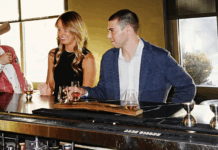

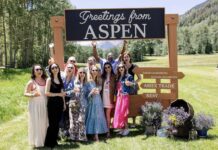


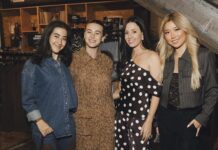




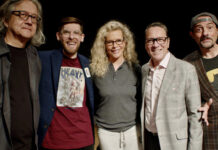

![From Medical Miracles to Movies: Indie Film, Bourbon, and Giving Back [Interview with Producer George Ellis] Dr. George Ellis shares how indie film, bourbon, and purpose collide](https://dailyovation.com/wp-content/uploads/2026/01/george-ellis-headshot-218x150.jpg)

